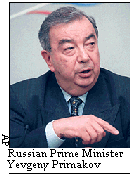Kremlin withholds report on POWs
By Bill Gertz
THE WASHINGTON TIMES
 Published in Washington,
D.C. 5am -- November 9, 1998
Published in Washington,
D.C. 5am -- November 9, 1998
Moscow is refusing to turn over a secret KGB document suggesting
captured Americans were taken to the Soviet Union in the late
1960s for "intelligence-gathering purposes," The Washington
Times has learned.
Secretary of State Madeleine K. Albright earlier this year
appealed to Russian Prime Minister Yevgeny Primakov, a former
KGB chairman, to release the document that the Pentagon
discovered in January and has been trying to obtain since then,
said Clinton administration and congressional officials familiar
with the matter.
The Russian government has told U.S. officials the plan was
never carried out, and Moscow recently turned down U.S.
government requests to study the intelligence document, saying
it is classified and will not be released, the officials said.
Discovery of the KGB document has raised hopes among
Pentagon POW investigators that information is in the KGB
archives about the fate of some 8,000 Americans still missing
from the Korean War, Vietnam War and other Cold War conflicts.
Because of the date, "it could be about Vietnam," said one
person involved in the issue who declined to be identified.
The document was first mentioned in the recently published
memoir of Russian historian Gen. Dmitri Volkogonov, who died of
cancer in December 1995. It also was disclosed in the general's
personal papers
that were
donated to the Library of Congress last year.
"I can confirm that senior U.S. government officials,
including Secretary Albright, have raised this important matter
with Russian counterparts and continue to seek further
clarification from them," State Department spokesman James Foley
told The Times.
General Volkogonov described the document in his book as
"sensational" and said he uncovered it while working as
co-chairman of the joint U.S.-Russian commission set up in 1992
to resolve prisoner of war and missing in action (POW-MIA)
issues from Korea and Vietnam, and the Cold War, when scores of
Americans were lost on spying missions.
Norman Kass, a Pentagon official who is executive director
of the U.S. side of the joint POW commission, said investigating
the KGB document is "the highest interest" of the commission.
The commission will meet in Moscow tomorrow when the KGB
document will be discussed, he said.
"We consider it significant," Mr. Kass said. "After all,
the people whose names appear in the papers were at the apex of
the Soviet leadership."
According to Gen. Volkogonov's book, the KGB document
outlining the program to exploit Americans was signed by
Vladimir Semichastny, head of the KGB secret political police
from 1961 to 1967.
Gen. Volkogonov wrote that immediately after discovering
the report he asked the KGB chairman at the time, Mr. Primakov,
to investigate. The document was located, but Mr. Primakov said
there was no information about the program.
There is no mention in the book or papers of what the KGB
planned to do with the captured Americans. According to Russian
defectors, the KGB used Americans to train Russian undercover
agents how to speak and act like Americans, as portrayed in
Nelson DeMille's 1989 novel, "The Charm School," about American
POWs from Vietnam who were forced to teach at a secret KGB
training school.
Americans also could have been forced to supply information
on U.S. military weapons systems, doctrine and tactics for
Russians who might have to fight against them.
According to Gen. Volkogonov, the POW commission resolved
many cases since 1992. But many were not because "quite a few
documents were destroyed," he wrote.
"However, one document, probably sensational, is still in
storage. I have a copy of it," he stated in his book. "Its
content is as follows: at the end of the 1960s the KGB (external
foreign intelligence) was given the task of delivering informed
Americans to the USSR for intelligence gathering purposes."
"When I found this sensational paper in a 'special pouch,'
I immediately went to Y.M. Primakov (Director of Foreign
Intelligence). He called in his people. They brought in a copy
of this project signed; it seems to me, by Semichastny. ..."
Gen. Volkogonov said the KGB searched for "traces" of the
intelligence operation. "These, the traces, as I had expected
'were not found,'" he wrote.
"This remained a secret which I could not penetrate," he
stated. "I also did not report this to my much-esteemed
Ambassador [Malcolm] Toon. I am speaking about this now in the
hope that these notes will make it into my book Reflections."
His Russian-language memoir published in September is titled
"Study of Time." Mr. Toon is the commission's co-chairman.
"History, especially Soviet history, is full of secrets,
and very often evil," Gen. Volkogonov wrote. "With the exception
of this incident, I can say that I have done something in order
to raise the mysterious curtain from them."
A recent CIA report on Vietnamese government cooperation on
American POWs stated that "a few reports of transfers of U.S.
POWs to Russia and other countries are unexplained and the books
remain open."
Former Czech intelligence officer Jan Senja told Congress
in 1996 that he supervised the transfer of some 200 American
POWs from Vietnam to the Soviet Union between 1961 and 1968. He
also claimed Soviet bloc intelligence services performed medical
experiments on American POWs.
Asked if President Clinton would mention the KGB document
when he meets Mr. Primakov later this month at the Asian
economic summit in Malaysia, White House National Security
Council spokesmen David Leavy said the agenda for the talks has
not been set.
A congressional aide said the administration stopped
pressuring Moscow for the document after the economic crisis in
August led to leadership changes.
Copyright © 1998 News World
Communications, Inc. Reprinted with permission.
 Published in Washington,
D.C. 5am -- November 9, 1998
Published in Washington,
D.C. 5am -- November 9, 1998